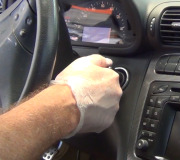My car:
1986 Ford Econoline e-150 5.0L v8, automatic, fuel injected.
Two fuel pumps, one in-line and one submerged in the tank. The in-line is new.
Just had some professional work done on it, the distributor cap was replaced, the Ignition Control Module is brand new, and the wire from the ignition coil replaced.
Now, my problem. Just starting today, I was driving up a hill, then when it levelled out, the engine cut out and I had to pull to the side. Immediately after I tried to start it but it just turned over indefinitely. A trick I picked up for when this happens is to cycle through the gears, then back to park, and it 100% starts up then. Almost as if the tranny doesn't know it's in park until I do that.
Unfortunately, shortly afterward, when shifting down from 3rd to 2nd, the engine immediately died again. I was able to use my tricks to get it running again but was more worried this time.
It died a 3rd and 4th time heading back home on the same trip. Once, when I was pulling onto the highway making a right hand turn. I might add that this particular stop sign was at an incline. The last time it died on me while running was on a straight stretch, without shifting from one gear to another, for no apparent reason.
I have not checked my spark plugs yet; I have not checked my engine timing. I'm suspecting something is wrong with fuel delivery. I read that when a car makes turns or climbs then levels, the fuel level inside the tank can vary to the point that the pump is starved and the engine will quit. Without putting too much stock into that notion, it does sound possible. Yet, this is a new problem. This hasn't happened the last month or so I've been driving the truck.
Where do you think I ought to start troubleshooting? Fuel relays? Timing belt?
Friday, April 23rd, 2010 AT 7:10 PM


